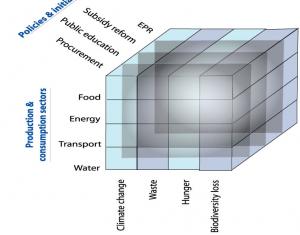
Integration refers to the act of bringing together and unifying things that are otherwise separate. ISF searches for those integrative strategies (or meta-strategies) which (1) address major environmental and/or social problems (i.e., impacts) resulting from (2) unsustainable production/consumption practices, processes and systems across sectors (e.g., food, energy, transport, water), through strategic coordination of the different but critically relevant strategies, initiatives, policies and approaches (e.g., procurement, education, subsidy reform, Extended Producer Responsibility) targeting different leverage points in the system (e.g., values, investment, production, distribution, consumption, waste/pollution). This integrative approach requires communication, collaboration and coordination among the different communities of practice engaged in those strategies/initiatives and sectors.

Adaptation is one of the primary mechanisms in the evolution of life. It is the response of organisms to a changing environment, to threats as well as to new opportunities. In response to climate change, adaptation refers to the actions communities need to take and prepare themselves for as the climate changes -- increasing temperatures, rising sea levels and flooding, desertification, migration of people and animals, extinction of species and other threats.

The Global Footprint Network describes the ecological footprint as "the only metric that measures how much nature we have and how much nature we use". It is often referred to as a way to assess the impact of our production and consumption practices on the environment. It provides an important tool in identifying the limits to growth.

One of the major sources of conflict and suffering is the deepening economic inequality around the world, as the distance between the overly wealthy and desperate poor relentlessly widens. Economic security is one of the foundations of quality of life. Eradicating poverty is one of the overarching objectives of sustainable development and a key to global peace and prosperity.

The concept of flows is central to integrative strategies. Material and energy flows are a focus of lifecycle analysis, supply chain management, and industrial metabolism. Global material flows are tracked to guide and monitor environmental and sustainability policies and impacts. Capital flows refer to the movement of money in investment and trade, and production, within companies, supply chains and networks. Knowledge and idea flows take place through media, the internet, interpersonal exchanges, educational and research institutions, social networks.

Framing is a concept and method for focusing attention on and identifying meaning(s) of a particular object, especially through the context given or highlighted. In the social sciences it may refer to the social construction of an object, person, issue or other phenomenon by the media, political parties, advertisers, artists, religion. Frames may be seen as mental schemas for interpreting or understanding, a cognitive basis for attributing meaning to perceptions and experience.

Sustainability involves interdependent spheres of action and interest working together in harmony through living systems. This can be seen in nature, as in the essential activity of pollination. Similiar relationships can been seen throughout ecosystems at the macro and micro levels, as can be seen in the complex root and microbial and root systems within soil sustaining vast forest habitats. In human-nature habitats, integrative strategies link diverse but ultimately common aims and approaches within and across different communities of practice and place.

Mitigation refers to action reducing the severity, seriousness, or painfulness of a problem, such as pollution or climate change. It may involve preventive action or rapid response to emergency situations. With regard to climate change it refers to actions by individuals, organizations, government agencies and institutions taking action to reduce carbon emissions and other greenhouse gases, changing consumption habits, manufacturing processes, building and fuel standards and other targets.

This concept refers to the overall welll-being of individuals and societies. "Improving the quality of life for all people" is considered the primary goal of sustainable development -- including physical and mental health, safety, economic security and equity, environmental quality, education, access to information, political freedom and human rights.

"The sustained ability of a community to utilize available resources to respond to, withstand, and recover from adverse situations."

We can think of sustainability as a balancing of three priorities: (1) healthy environment – caring for the living systems upon which our lives depend; (2) social quality of life – how people in communities are treated, if their needs are being met -- as well as those of future generations; (3) a stable and fair economy, where our production/consumption systems meet our various needs without undermining the health of people and planet.

Transdisciplinarity refers to the integration and application of different and more specialized areas of knowledge. Transdisciplinary approaches are especially important to sustainability issues and efforts, which often call for contributions across the physical and biological sciences, the social sciences and humanities.

Transitions to sustainability may take multiple shapes, involving very different demands and challenges.

One of the goals of sustainability is to improve the quality of life and well-being for everyone. But what does that mean?
